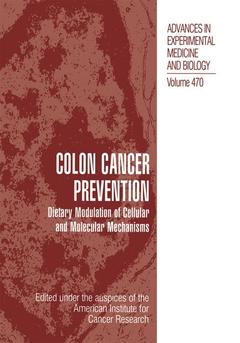Colon Cancer Prevention, 1999 Dietary Modulation of Cellular and Molecular Mechanisms Advances in Experimental Medicine and Biology Series, Vol. 470
Langue : Anglais
Auteur : ABROMS

The Eighth Annual Research Conference of the American Institute for Cancer Research, held in Washington, D.C., September 3-4, 1998, was on the subject "Colon Cancer Prevention: Dietary Modulation of Cellular and Molecular Mechanisms," with participants representing various disciplines interested in this area. One of the speak ers provided an appropriate quote from 17th century physician Thomas Adams: "Pre vention is better than healing because it saves the labor of being sick," which aptly describes the need for the prevention of cancer. An overview of normal and abnormal colonic development emphasized that although the typical human colon undergoes 1013 cell divisions by age 60, with the asso ciated possibilities for error, relatively few colon tumors develop. Since dietary modu lation leads to extremely small changes in colonic cells over a long period, animal models are useful to time, observe, and delineate the events associated with colon cancer. In the development colon cancer, the inactivation of the adenomatous polyposis coli (Apc) gene is one of the earliest known events. Normally Apc downregulates the cellular protein beta-catenin, but this is lost during cancer development. Beta-catenin may itself be an oncogene; it has a short half-life, but it is stabilized by binding to is more prevalent in the cell nucleus, the gene shuttles caherin. Although the Apc between the nucleus and the cytoplasm.
1. Transcriptional Regulation in Intestinal Development: Implications for Colorectal Cancer.- 2. Colonic Cell Proliferation, Differentiation, and Apoptosis.- 3. Defects in the Regulation of ?-Catenin in Colorectal Cancer.- 4. Dietary Lipids, Inflammation, and Colon Cancer.- 5. Sulindac Sulfone Induced Regression of Rectal Polyps in Patients with Familial Adenomatous Polyposis.- 6. Prevention of Colon Cancer and Modulation of Aberrant Crypt Foci, Cell Proliferation, and Apoptosis by Retinoids and NSAIDs.- 7. Digested Fiber from Wheat Bran Induces cdk Inhibitors which Block Colon Epithelial Cells in G1.- 8. Mechanisms by Which Energy Restriction Inhibits Carcinogenesis.- 9. Dietary Intervention Studies of Colorectal Cancer.- 10. The Genetics of Hereditary Non-Polyposis Colorectal Cancer and Non-Polypotic Colon Cancer.- 11. Familial Association.- 12. Colonic Cell Proliferation and Apoptosis in Rodent Species: Modulation by Diet.- 13. Nonsteroidal Anti-Inflammatory Drugs (NSAIDs), Cyclooxygenases, and the Cell Cycle: Their Interactions in Colon Cancer.- Abstracts.
Date de parution : 09-2012
Ouvrage de 165 p.
17.8x25.4 cm
Date de parution : 02-2000
Ouvrage de 170 p.
Thèmes de Colon Cancer Prevention :
Mots-clés :
apoptosis; cancer prevention; carcinogenesis; cell; genetics; inflammation; prevention
© 2024 LAVOISIER S.A.S.



